Taiwan now has three Michelin three-star restaurants, after JL Studio in Taichung and Tairroir (泰芮) in Taipei were promoted from the list of two-star restaurants last year, Michelin Guide announced yesterday.
From 2018 to last year, Le Palais (頤宮) of Palais de Chine Hotel Taipei was the only three-star restaurant in Taiwan. The restaurant was awarded a three-star rating again this year and has won the honor for six consecutive years.
Le Palais chief chef Ken Chan (陳偉強) said that he was nervous the night before the award ceremony, despite having been recognized multiple times.
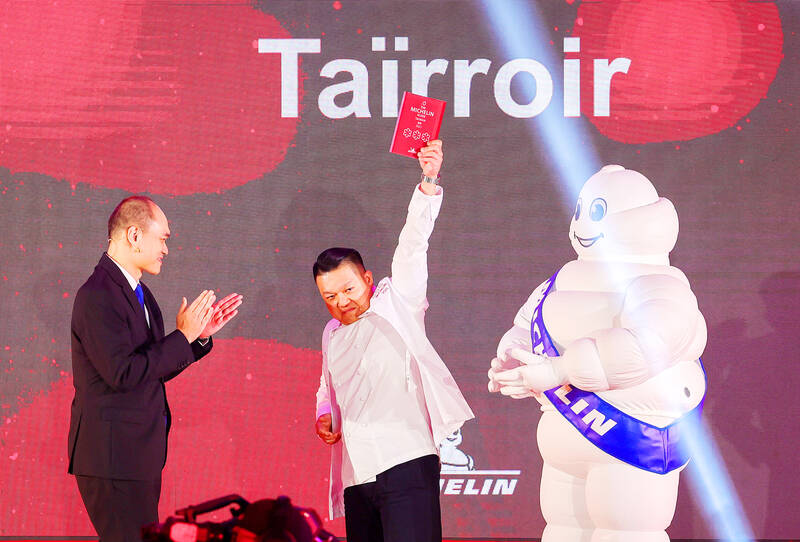
Photo: CNA
“The [COVID-19] pandemic changed our lifestyles in many ways. Before the pandemic, many families liked to dine out. Now they just order whatever they like to eat on Uber Eats and eat at home. Now that the pandemic has eased, more people should dine out more and enjoy food,” Chan said.
The dining culture in Taiwan has become more open and diverse in the past 10 years and the nation is on its way to becoming a paradise for fine diners, Chan said.
JL Studio is the world’s first restaurant featuring Singaporean cuisine to secure a three-star rating.
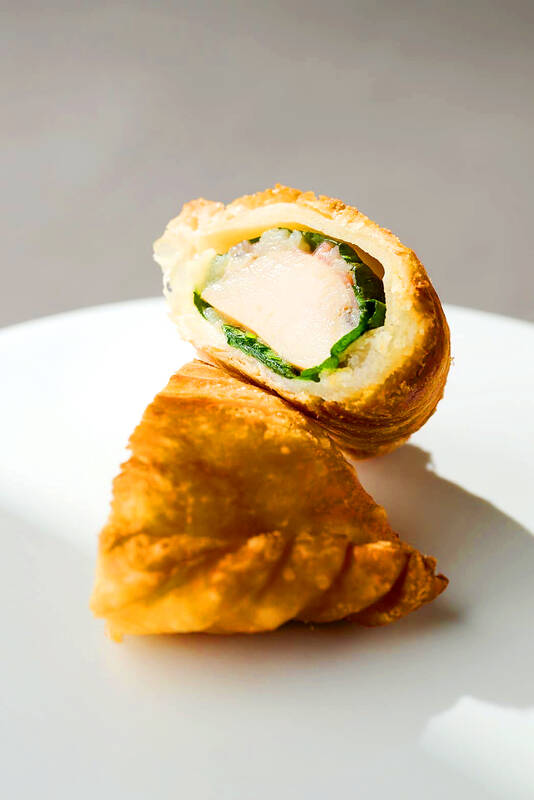
Photo courtesy of JL Studio
Chef Jimmy Lim (林恬耀) said that he originally set out to do modern European cuisine at JL Studio, but decided to go with Singaporean cuisine instead.
“For many years, I tried to do cuisines that were not native to me. I looked at the menu of French cuisine, but it did not speak to me... My investors were surprised when I told them I decided to do Singaporean cuisine. I told them: ‘Give me three years, let me try.’ I am glad I made that decision.”
“When I first started, many people thought that Singaporean cuisine was nothing more than snacks. They would ask why I sell laksa noodles or Hainan chicken rice for more than NT$1,000, when Taiwanese can get them for one-tenth of the price I charge?” Lin said.
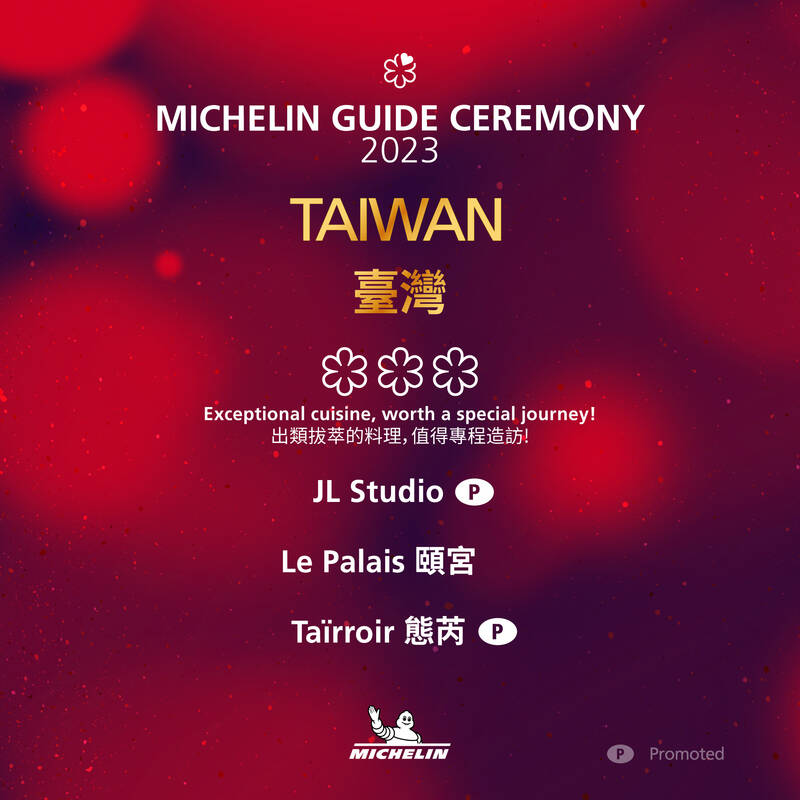
The recognition from the Michelin Guide is “a small step forward for Singaporean cuisine,” he said.
Tairroir, which features a fusion of Taiwanese and French cuisines, secured a one-star rating in 2018 and maintained a two-star rating from 2019 until last year.
Chef Kai Ho (何順凱) said he cried after hearing that his restaurant has secured a three-star rating, because his team’s efforts over the years have finally been recognized.
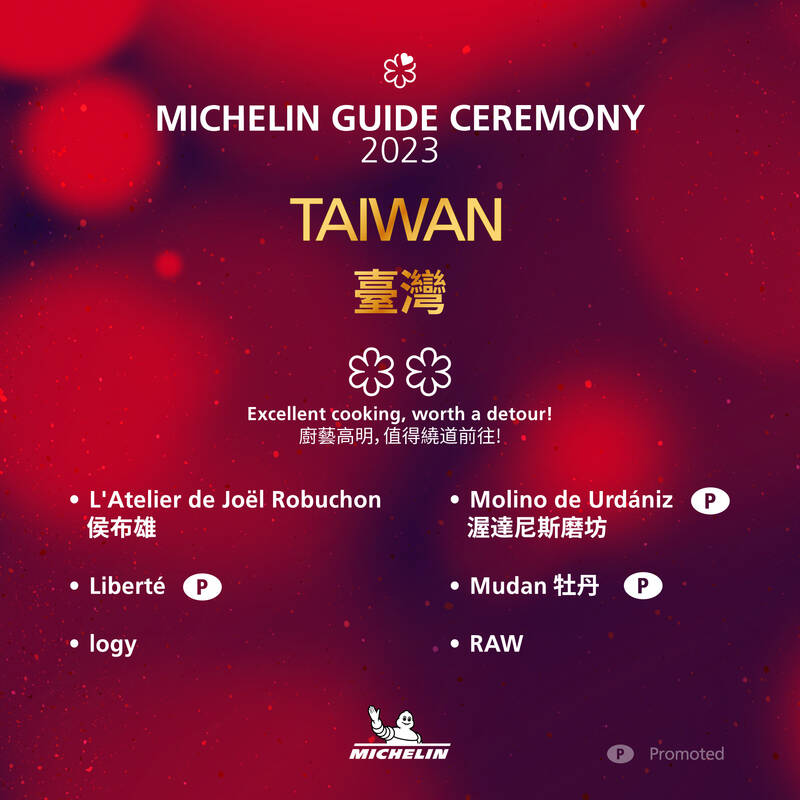
“When I started my culinary career, I never thought I would become a chef in a star-rated restaurant. I do not think my life has peaked after my restaurant garnered a three-star rating. I just thought our restaurant service and dining quality should deserve three stars,” Ho said.
“This honor is not a shackle. It allows me to use my creativity freely. Over the years, my attitude and weight might change, but my passion for cooking has never changed,” he said.
Asked why Michelin Guide has chosen two new three-star restaurants featuring Singaporean and Taiwanese cuisines this year, Lim said the France-based gourmet publication in the past chose predominantly French restaurants.
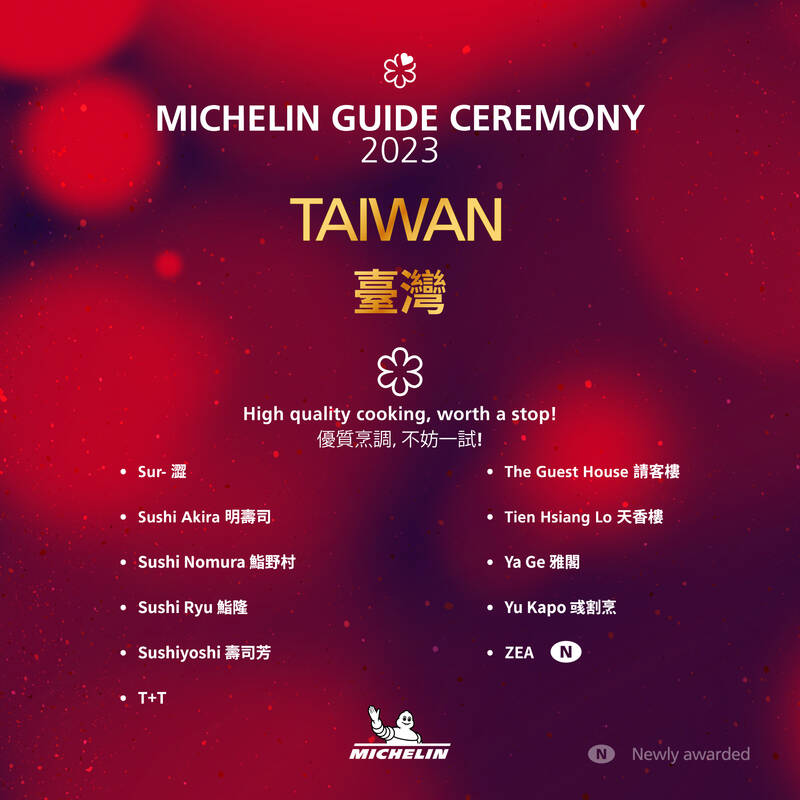
“However, it also identified unique cuisine styles in different countries and evaluated them based on their standards. This has helped chefs of various cuisines to be seen by all,” he said.
Ho said that customers were at first not impressed by the Taiwanese cuisine and dining services presented at his restaurant.
“While the tastiness of food remains the top priority, more customers are now receptive to the idea that there is neither a pure French cuisine nor a pure Taiwanese cuisine. As a Taiwanese, I am creating what I imagined the food could be like,” Ho said.
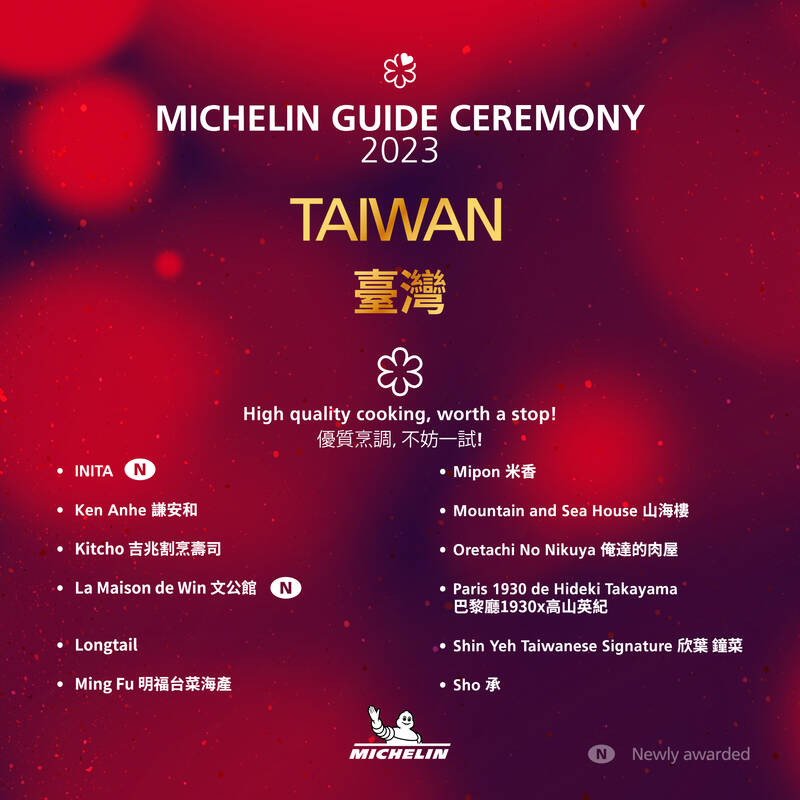
Michelin Guide also gave a two-star rating to six restaurants, which are in Taipei, Taichung and Kaohsiung, and a one-star rating to 35 restaurants.
There are no star-rated restaurants in Tainan this year, which is the same as last year.
Of the 35 one-star restaurants, seven were first-timers: A cut, Ad Astra, Ban Bo (斑泊), Inita and Zea in Taipei, La Maison de Win (文公館) in Taichung and Haili in Kaohsiung.
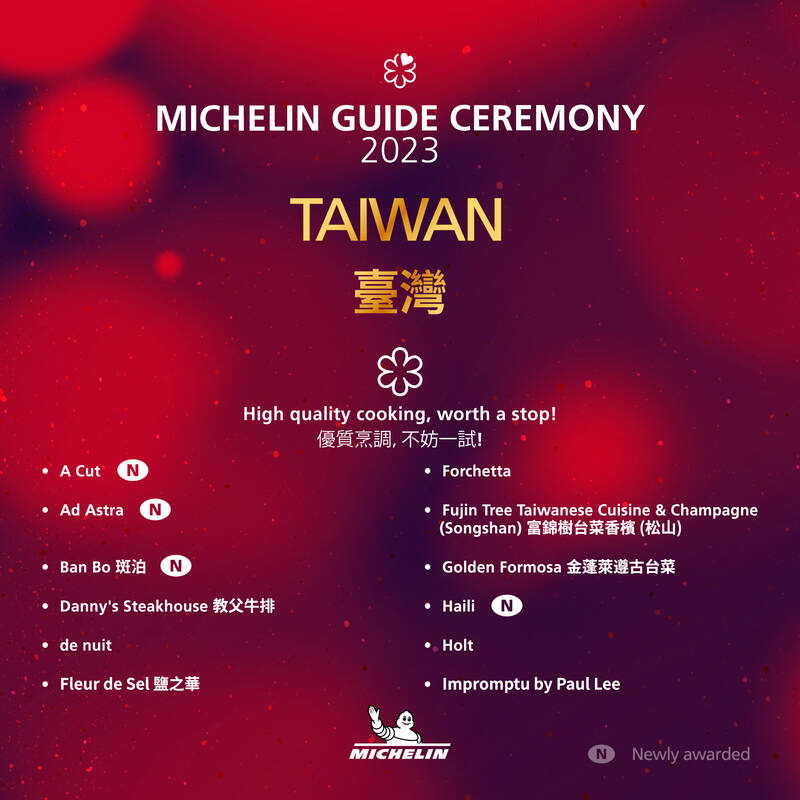
Three new two-star restaurants were one-star ones last year: Molino de Urdaniz (握達尼斯磨坊) and Mudan (牡丹) in Taipei and Liberte in Kaohsiung.
The Guest House was the only restaurant to be downgraded from two stars to one star.
Two new Michelin Green Star restaurants are Hosu (好嶼) and Thomas Chien.

FORCED LABOR: A US court listed three Taiwanese and nine firms based in Taiwan in its indictment, with eight of the companies registered at the same address Nine companies registered in Taiwan, as well as three Taiwanese, on Tuesday were named by the US Department of the Treasury’s Office of Foreign Assets Control (OFAC) as Specially Designated Nationals (SDNs) as a result of a US federal court indictment. The indictment unsealed at the federal court in Brooklyn, New York, said that Chen Zhi (陳志), a dual Cambodian-British national, is being indicted for fraud conspiracy, money laundering and overseeing Prince Holding Group’s forced-labor scam camps in Cambodia. At its peak, the company allegedly made US$30 million per day, court documents showed. The US government has seized Chen’s noncustodial wallet, which contains

SUPPLY CHAIN: Taiwan’s advantages in the drone industry include rapid production capacity that is independent of Chinese-made parts, the economic ministry said The Executive Yuan yesterday approved plans to invest NT$44.2 billion (US$1.44 billion) into domestic production of uncrewed aerial vehicles over the next six years, bringing Taiwan’s output value to more than NT$40 billion by 2030 and making the nation Asia’s democratic hub for the drone supply chain. The proposed budget has NT$33.8 billion in new allocations and NT$10.43 billion in existing funds, the Ministry of Economic Affairs said. Under the new development program, the public sector would purchase nearly 100,000 drones, of which 50,898 would be for civil and government use, while 48,750 would be for national defense, it said. The Ministry of

SENATE RECOMMENDATION: The National Defense Authorization Act encourages the US secretary of defense to invite Taiwan’s navy to participate in the exercises in Hawaii The US Senate on Thursday last week passed the National Defense Authorization Act (NDAA) for Fiscal Year 2026, which strongly encourages the US secretary of defense to invite Taiwan’s naval forces to participate in the Rim of the Pacific (RIMPAC) exercise, as well as allocating military aid of US$1 billion for Taiwan. The bill, which authorizes appropriations for the military activities of the US Department of Defense, military construction and other purposes, passed with 77 votes in support and 20 against. While the NDAA authorizes about US$925 billion of defense spending, the Central News Agency yesterday reported that an aide of US

NINE-IN-ONE ELECTIONS: Prosecutors’ offices recorded 115 cases of alleged foreign interference in the presidential election campaign from August 2023 to Dec. 13 last year The National Security Bureau (NSB) yesterday said that it has begun planning early to counter Chinese interference in next year’s nine-in-one elections as its intelligence shows that Beijing might intensify its tactics, while warning of continued efforts to infiltrate the government and military. The bureau submitted a report to the Legislative Yuan ahead of a meeting today of the Foreign Affairs and National Defense Committee. “We will research situations in different localities and keep track of abnormalities to ensure that next year’s elections proceed without disruption,” the bureau said. Although the project is generally launched during election years, reports of alleged Chinese interference